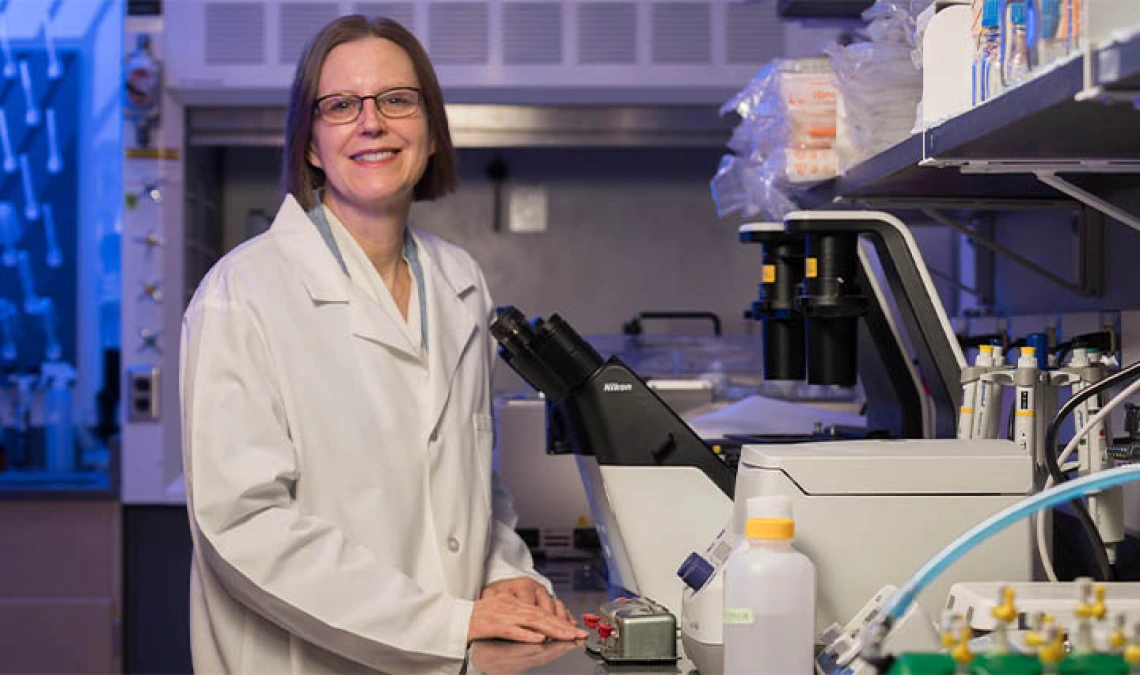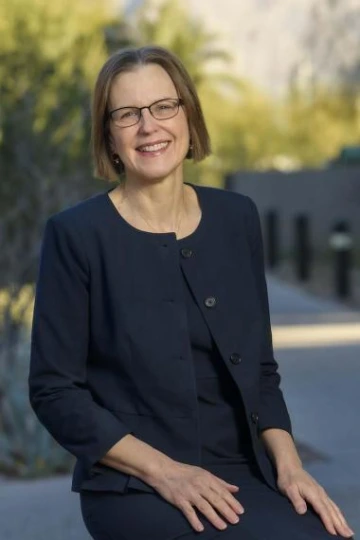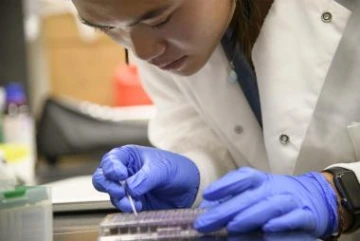Connecting with Director Sweasy: Cancer Research is Personal
Dr. Joann Sweasy discusses what inspired her to become a cancer researcher, how research has evolved and what the future looks like for the UArizona Cancer Center.

In June 2019, Joann Sweasy, PhD, arrived at the University of Arizona Cancer Center to serve as the associate director for basic sciences. By October that year, Dr. Sweasy was named the center’s interim director. Nine months later, she was named director.

Dr. Joann Sweasy is the inaugural holder of the Nancy C. and Craig M. Berge Endowed Chair for the director of the Cancer Center.
It was a whirlwind first year for Dr. Sweasy, but it was nothing like the next 12 months when she carefully guided the University of Arizona Cancer Center through the pandemic.
The Cancer Center is the only National Cancer Institute (NCI)-designated Comprehensive Cancer Center headquartered in the state and one of 51 in the country. Despite the challenges presented by COVID-19, the center has continued serving cancer patients with cutting edge cancer care, research and treatment, including the launch of the Arizona Clinical Trials Network.
A culture of giving is among the significant reasons why Dr. Sweasy considers the past year a success. In October 2020, the Cancer Center announced an $8.5 million gift to establish the Ginny L. Clements Breast Cancer Research Institute. Dr. Sweasy also is the inaugural holder of the Nancy C. and Craig M. Berge Endowed Chair for the director of the Cancer Center.
Dr. Sweasy recently shared more with Health Sciences Connect about her first year as director, her career as a cancer researcher and her vision for the future.
What have these last 12 months been like for you as director of the Cancer Center?
It has been very intense and has absolutely flown by, but it has been one of the most rewarding years of my life. I feel like I have participated in something that is incredibly worthwhile. The most important things are to be sure that we are serving our communities and that the people in the state of Arizona are well-served by this cancer center. It has been an incredible privilege to be able to do that.
We have accomplished so much in a short time, including the development of a new strategic plan and writing our competing Cancer Center Support Grant (CCSG) application that we will submit later this year to the National Cancer Institute (NCI) at the National Institutes of Health (NIH). The CCSG provides us funding and designates us as an NCI Comprehensive Cancer Center. The designation reflects the strength and the exceptional clinical practice and science that occurs at the cancer center.

The Cancer Center is the only National Cancer Institute (NCI)-designated Comprehensive Cancer Center headquartered in the state and one of 51 in the country.
We are thrilled for the Arizona Clinical Trials Network, which will create opportunities for us to reach people that may otherwise not have access to care. We also are so thankful for Ginny Clements’ incredibly generous gift, which is going to transform breast cancer research and clinical care.
Additionally, we started several faculty searches, hired new staff and revamped our seed funding program to ensure that we are conducting impactful, high-reward science. That part is important to me because we must think boldly. It is essential that we continue to re-invest because we have legendary basic science and prevention science here. We want to bring more of those discoveries into the clinic in addition to being top of the field.
When did you first think about becoming a scientist who focused on cancer?
Two things led me into cancer research. The first was learning about DNA. It’s my favorite molecule, and I loved thinking about DNA because I had really great science teachers in elementary school.
Then, when I was 9 years old, my 4-and-a-half-year-old cousin died of leukemia. She and I were very close, and I wanted to do everything I could to help. Two years later, another close childhood friend also died of leukemia.
So, with my merging love for DNA and wanting to do something to make a difference, it seemed to me like cancer research was the best thing for me.
Those events really changed my life. And it was by total coincidence, but when I signed my director’s contract last year, it was on my cousin’s birthday. I still keep a photo of her on my desk.
This is the 50th anniversary of the National Cancer Act of 1971. How has cancer research transformed since then?
The National Cancer Act made such a difference because it resulted in huge investments in cancer research that not only changed the way cancer is treated, but also that led to a greater understanding of basic biological mechanisms of cancer development and treatment. It has supported the careers of talented and creative people who have made a real difference in how we treat cancer.
When I think back to my cousin passing away – it was in 1968 – the treatment options were pretty horrific. Her options were quite limited, and she died very quickly.
What has changed since then is remarkable. Back then, most children with leukemia died. Now most of those children live. That is just incredible. And it’s because treatments then were all one-size-fits-all. Now we have all kinds of targeted therapies and precision medicine that give us so much hope. That all started with the National Cancer Act.
The Cancer Center is one of 51 NCI-designated Comprehensive Cancer Centers, and the only one headquartered in the state. What is the significance of this designation?
It means that our center is here to serve the community. We work in multidisciplinary teams of basic scientists, clinicians and physician-scientists to make sure that the research we are conducting and the care that we are delivering to patients is meeting the needs of our communities. Studies show that patients treated at an NCI-designated Comprehensive Cancer Center have better quality care and outcomes from treatment. We also train the next generation of diverse cancer researchers, an important goal of our cancer center.
What has been the focus of your new strategic plan and the application for the CCSG renewal?
We conducted an entire strategic planning process including an analysis of strengths, weaknesses, opportunities and threats. There have been very careful analyses and stakeholder interviews. We then crafted a strategic plan that has five goals. Each goal has 20 to 30 tactics for achieving it. Now, we are ready to begin assigning metrics to those goals. We also have three aspirational trans-center themes that are attached to those goals. The first one is cancer and the environment. This includes both the natural environment and the tumor microenvironment. The second theme is cancer imaging and bioengineering, and the third is novel therapeutics and preventive interventions.
In addition, our Community Outreach and Engagement team took a deep dive into the statistics to understand the cancer burden and disparities that affect our populations. We identified five priority cancers of greatest concern, including gastrointestinal (GI) cancer, genitourinary (GU) cancer, breast cancer, lung cancer and melanoma. This information has been valuable, and our program leaders have developed insightful strategic areas of recruitment where if we brought in one or two more people, we could become preeminent leaders in these areas.
What does the future look like for the Cancer Center?
My vision is for us to be the preeminent NCI-designated Comprehensive Cancer Center in the Southwest and beyond. We want to be known for our work in the tumor microenvironment and in our five priority cancers. We want to build on our already strong reputations for prevention research and basic science research. We can do all that. I am truly inspired by the people I get to work with each day.



